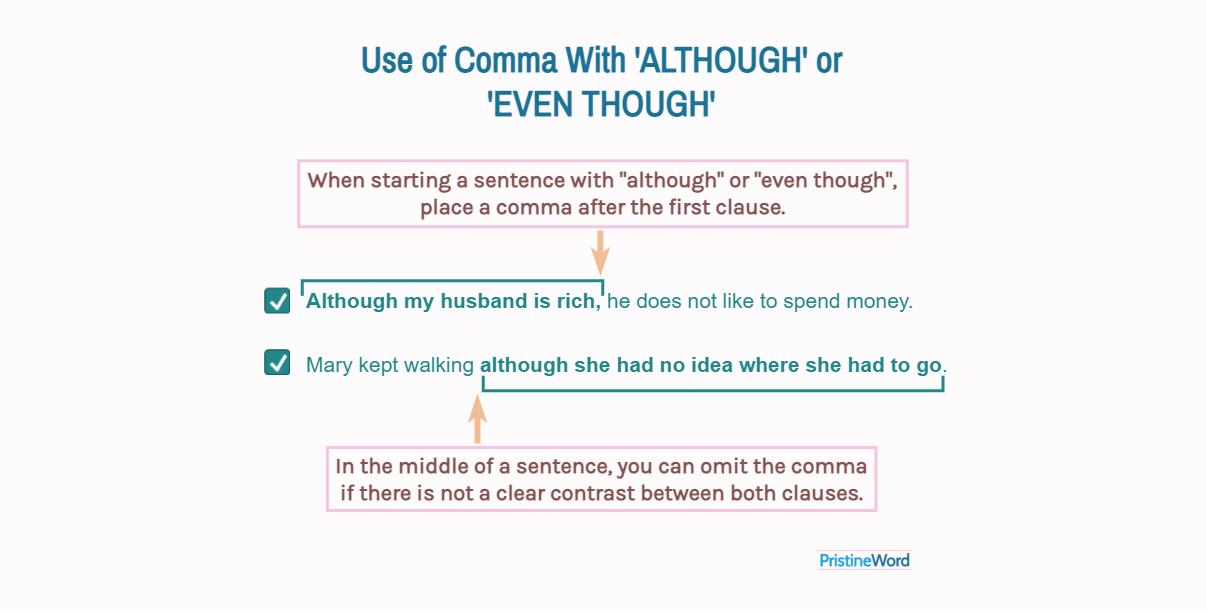When starting a sentence with "although" or "even though", place a comma after the first clause of the sentence.
When starting a sentence with "although" or "even though", place a comma after the first clause.
Although my husband is rich, he dislikes spending money.
Although my husband is rich he dislikes spending money.
In the middle of a sentence, you can omit the comma if there is not a clear contrast between both clauses.
Mary kept walking although she had no idea where she had to go.
If there is a strong contrast between the two parts of a sentence, add a comma before "although" to separate them.
She was really sad, although she had won the championship.
Never put a comma after "although" or "even though".
Although life is short, you have to enjoy it.
Although, life is short, you have to enjoy it.
Contents
1. Basic Concepts
"Although", "though" and "even though" are subordinating conjunctions:
- They are followed by a subject and a verb (e.g., "although it is raining").
- You can use them to show contrast between two parts (clauses) of a sentence.
"Although" vs. "Though"
There is no significant difference between "although" and "though". The conjunction "though" is slightly more informal, but both have the same meaning and can be used interchangeably.
Although he is tall, he doesn't like playing basketball.
Though he is tall, he doesn't like playing basketball.
They can be placed at the beginning or in the middle of a sentence. You can also end a sentence with "though" (mostly in spoken English); however, you cannot really end a sentence with "although".
2. Starting a Sentence with 'Although' or 'Even though'
"Although" and "even though" are used to introduce a dependent clause. When we start a sentence with a dependent clause, we add a comma after it.
Although John exercises and trains every day, he is gaining weight.
Although John exercises and trains every day he is gaining weight.
Exceptions? There are no exceptions. Use a comma to separate both clauses if the clause introduced by "although" comes first.
Follow the same comma strategy when using "even though". "Even though" is simply a stronger form of "although". You can use "even though" to add emphasis. What is the emphasis on? It is on the expectation of the reader. The first part of a sentence expresses an idea, but the second part says something entirely different or unexpected.
Even though he didn't commit the crime, he went to jail.
The prepositions "despite" and "in spite of" are also used to show contrast, but they are not followed by a subject and verb. Instead, "despite" (or "in spite of") is followed by a noun, a noun phrase, a pronoun, or a gerund.
3. Using 'Although' or 'Even though'in Mid-Sentence
"Although", "though", and "even though" can be used in mid-sentence to show contrast between two clauses. If the contrast is not strong, the comma can be omitted.
Alice spends quality time with her kids although she has a lot of work and responsibilities.
But place a comma before "although" or "even though" if the contrast is strong.
Rebecca was crying, although she had won a Nobel Prize.
Since "even though" indicates a stronger and more emphatic contrast, we usually place a comma before "even though".
He doesn't have any money, even though his parents are wealthy.
4. More Examples
- John wasn't wearing a coat, although it was freezing.
- Although I wanted to start a food blog last December, I decided to wait for a few months.
- Unemployment remains high although economic activity is picking up.
- Home prices continue to rise, even though sales are falling.
- Although the salary was low, I decided to accept the job offer.
- I would like playing basketball, even though I feel as if I'm not good enough.
- Here you can buy high-quality headphones, although they are extremely cheap.
- Olivia isn't well-paid, although she has highly specialized skills and proficiency.
- Although Peter didn't speak Japanese, he managed to make himself understood.
- We are committed to stop fighting with our employees although the conflict has not ended.
5. Conclusion
These simple guidelines will help you decide whether to include a comma when using "although" or "even though" in a sentence.
- Place a comma after the first clause if a sentence starts with "although" or "even though".
- When using "although" or "even though" in mid-sentence, add a comma if there is a strong contrast between the two clauses.
- Never put a comma after "although" or "even though".

